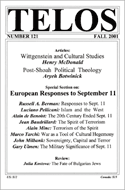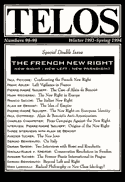 The terrorist attacks on 9/11 created a chain of events that has led not only to the “othering” of Islam and its followers, but also to an increase in the securitization of society as a whole. In “Sovereignty, Empire, Capital, and Terror,” John Milbank examines the aftermath of the 9/11 terrorist attacks, notably the wars in Iraq and Afghanistan and the increasing intervention of governments into the privacy of their respective populations. He questions the wars and the increasingly illiberal turn by the government in regards to dealing with terrorists and criminals and the elimination of due process and, in some cases, habeus corpus. He writes that, “the question that one should ask in response to the immediate aftermath the events of September 11 is why there was outrage on such a gigantic scale” (146). He goes on to identify two reasons: first, the threat against the sovereign, and second, the increasing legitimization by Western governments to intervene in so-called “rogue or failed states,” to ensure the spread of the neoliberal market and prevent the defection of these states from the Western dominated capitalist system. Although there are indeed questions concerning the delineation between national security and the democratic process, the answers to these questions are harder to come by.
The terrorist attacks on 9/11 created a chain of events that has led not only to the “othering” of Islam and its followers, but also to an increase in the securitization of society as a whole. In “Sovereignty, Empire, Capital, and Terror,” John Milbank examines the aftermath of the 9/11 terrorist attacks, notably the wars in Iraq and Afghanistan and the increasing intervention of governments into the privacy of their respective populations. He questions the wars and the increasingly illiberal turn by the government in regards to dealing with terrorists and criminals and the elimination of due process and, in some cases, habeus corpus. He writes that, “the question that one should ask in response to the immediate aftermath the events of September 11 is why there was outrage on such a gigantic scale” (146). He goes on to identify two reasons: first, the threat against the sovereign, and second, the increasing legitimization by Western governments to intervene in so-called “rogue or failed states,” to ensure the spread of the neoliberal market and prevent the defection of these states from the Western dominated capitalist system. Although there are indeed questions concerning the delineation between national security and the democratic process, the answers to these questions are harder to come by.
|
As an occasional feature on TELOSscope, we highlight a past Telos article whose critical insights continue to illuminate our thinking and challenge our assumptions. Today, Beau Mullen looks at Alain de Benoist’s “The Idea of Empire,” from Telos 98–99 (Winter 1993/Spring 1994). Today concludes the series of five blog entries aimed at understanding the current political crisis in the European Union through a Schmittian lens. (For the previous posts, see part 1, part 2, part 3, and part 4.) In this post, Michael Marder asks what it would take for the EU to overcome the crisis. The answer, he argues, is nothing less than the EU constituting itself anew, by way of contesting the meaning of the European political subjectivity. Toward a New Self-Constitution of Europe? What remains, within the framework the European Union, is the constitution in a relative sense, dissolved “into a multitude of individual, formally equivalent constitutional laws.”[1] We face an expression without anything to express, devoid if not of meaning then of a connection to the sources of meaningfulness. The relegation of constitutional unity to the background and its substitution with constitutional details suits well that institutional arrangement where unity does not actually exist, that is, one where it is not bound to the texture of political existence. The multitude of EU laws is groundless in a different sense from the groundlessness of the absolute concept of the constitution, which is rooted in actual existence and, therefore, self-grounded: “Every existing political unity has its value and its ‘right to existence’ not in the rightness or usefulness of norms, but rather in its existence.”[2] Assuming that this necessary precondition for constitutionality has not been set in place, the main challenge Europe is facing, one that is more fundamental than solving the financial and political crises it is embroiled in, is to attain its political existence, to constitute itself. This is the fourth in a series of five blog entries aimed at understanding the current political crisis in the European Union through a Schmittian lens. (For the previous posts, see part 1, part 2, and part 3.) The hollowness of the EU’s political institutions implies that they are not lively enough to re-constitute themselves so as to cope with new challenges and changing circumstances. That is why the current crisis strikes so deeply at the foundations of the EU and threatens to overwhelm the order it had attempted to institute without taking the question of sovereignty into account. Europe’s Dynamic De-Constitution In line with the existential provenance of the form of constitution, such a form cannot be conceived as a static thing but, rather, as a process of formation, or, in Schmitt’s words, “the principle of the dynamic emergence of political unity, of the process of constantly renewed formation and emergence of this unity from a fundamental or ultimately effective power and energy.”[1] It would appear that this dynamic concept of constitution holds a redemptive hope for the EU, which prides itself on being a work-in-progress oriented by the still incomplete tasks of European integration. But this dynamism is just that—a mere appearance. First, as a “union,” the European Union postulates the apriori conditions of unity, those pre-established guidelines with which candidate states must comply and which do not dynamically (organically) emerge in the heat of political life. An incomplete project of unification, it adds on new members in the manner of mineral accretion, as extraneous layers superimposed on an equally dead core. Second, the inherent limits of unity are determined by the limits of the EU competence that acknowledge an irreducible fragmentation of political existence, as diverse as the distinct constitutional traditions of member states make it out to be. The feigned dynamism of the Union’s expansion occludes from view the stagnation of its ossified form, drained of “effective power and energy.” This is the third in a series of five blog entries aimed at understanding the current political crisis in the European Union through a Schmittian lens. (For the previous posts, see part 1 and part 2.) The argument of the third installment is simple: Because the European Union lacks a political existential vibrancy, its institutions—the formal stratum of its constitution—are equally hollow. In other words, what we get in the EU is form without substance, provided that substance is understood in a markedly existential sense, as the underlying subject of political existence. Europe’s Formal De-Constitution The constitution conceived as “a special type of political and social order” is the second meaning of the term Schmitt isolates in Constitutional Theory.[1] It is important to understand that he operates with a deformalized concept of form as a direct expression of existential content; constitution is “a special form of rule not detachable from . . . political existence.”[2] If so, then everything we said about the existential vacuum of the EU applies to its substantial form: since this does not exist, empty procedural formalism laboriously creates a façade of order, a speculative arrangement not grounded in actual political life. As a result, an artificial division of competences is established between national and European laws, putting in place an abstract order with the indispensable formulation of the relations of supremacy and subordination. (Hence, the Articles 3.a.1 and 3.b.1 of the Treaty of Lisbon: “The limits of Union competences are governed by the principle of conferral. The use of Union competences is governed by the principles of subsidiarity and proportionality.”) This is the second in a series of five blog entries aimed at understanding the current political crisis in the European Union through a Schmittian lens. (Read part 1 here.) In this post, Michael Marder suggests that a profound source of the problem is that the EU is not rooted in the collective existence of its citizens. In place of a political constituting subject, we find nothing but crass economic interests, covered over with a thin rhetorical veil. For a more extensive discussion of Schmitt, see Michael Marder’s Groundless Existence: The Political Ontology of Carl Schmitt. Europe’s Existential De-Constitution The “absolute concept of the constitution” refers to the constitution as a whole,[1] united not by virtue of an external system of basic laws but thanks to the pre-constitutional source from which these laws emanate and derive their legitimacy. Schmitt notes that “constitution in the absolute sense can mean, to begin with, the concrete manner of existence that is given with every political unity,”[2] whereby the “state does not have a constitution” but “is constitution, in other words, an actually present condition, a status of unity and order.”[3] In light of the already mentioned political existential vacuum at the core of the European Union, combined with the fact that it is neither a state nor a confederation of states, we may surmise that it is not a constitution, even though it claims the right to determine the conditions of its unity and order. Since there is no “concrete manner of existence” to draw upon, the status of the EU is equivalent to the formal guidelines, to which potential member states must adhere if they are to gain the right of admission. The deficit of actual unity is remedied by the imposition of ideal unity, procedural at worst and metaphysical at best. Instead of strengthening the status of the EU, this imposition makes it ever more precarious: it sets the stage for a violent standoff between the emergent realities of political existence and the idealities of an alien form foisted upon them. |
||||
|
Telos Press Publishing · PO Box 811 · Candor, NY 13743 · Phone: 212-228-6479 Privacy Policy · Data Protection Copyright © 2024 Telos Press Publishing · All Rights Reserved |
||||
 Few political concepts have appeared as destined to be cast into history’s dustbin as that of empire. The nation-state is the most widely accepted model for sovereign territories, and imperial ambitions of nations are often condemned by the international community. The existence of great empires, such as that of the Romans or of the Holy Roman Empire, it appears, are simply regimes that are relics of a distant, less enlightened historical era. The areas once encompassing the great empires have now fractured into sovereign nation-states, each with its own polity and allegiances. Furthermore, serious modern confederation between nations is most often based on monetary concerns, not the furtherance of any imperial goal or ambition. The sun, it could be said, has set on the idea of empire.
Few political concepts have appeared as destined to be cast into history’s dustbin as that of empire. The nation-state is the most widely accepted model for sovereign territories, and imperial ambitions of nations are often condemned by the international community. The existence of great empires, such as that of the Romans or of the Holy Roman Empire, it appears, are simply regimes that are relics of a distant, less enlightened historical era. The areas once encompassing the great empires have now fractured into sovereign nation-states, each with its own polity and allegiances. Furthermore, serious modern confederation between nations is most often based on monetary concerns, not the furtherance of any imperial goal or ambition. The sun, it could be said, has set on the idea of empire. 






